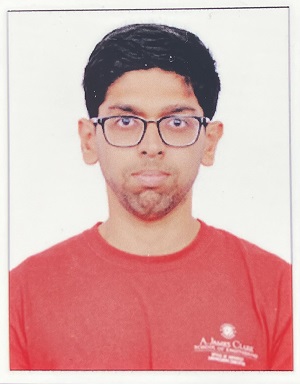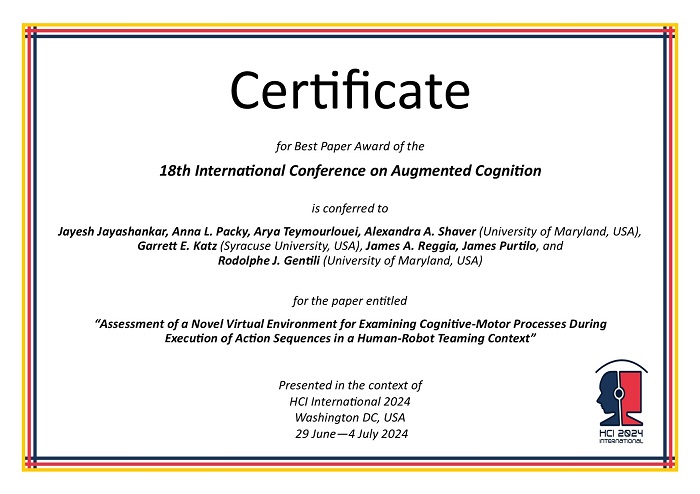
The Best Paper Award of the 18th International Conference on Augmented Cognition
has been conferred to
Jayesh Jayashankar, Anna L. Packy, Arya Teymourlouei, Alexandra A. Shaver (University of Maryland, USA),
Garrett E. Katz (Syracuse University, USA),
James A. Reggia, James Purtilo, and Rodolphe J. Gentili (University of Maryland, USA)
for the paper entitled
"Assessment of a Novel Virtual Environment for Examining Cognitive-Motor Processes During Execution of Action Sequences in a Human-Robot Teaming Context"

Jayesh Jayashankar
(presenter)

Best Paper Award for the 18th International Conference on Augmented Cognition, in the context of HCI International 2024, Washington DC, USA, 29 June - 4 July 2024

Certificate for Best Paper Award of 18th International Conference on Augmented Cognition presented in the context of HCI International 2024, Washington DC, USA, 29 June - 4 July 2024
Paper Abstract
"With the development of advanced AI and robotic systems, there is a growing interest in examining human-robot teaming. While the vast majority of human-robot studies has focused on technological developments, only a limited body of work has considered employing neurophysiological data and real-world activities to examine human cognitive-motor processes in such a teaming context. Although human-robot teaming can be examined using physical systems, virtual environments also offer numerous advantages such as versatility, scalability, and cost-effectiveness. Therefore, here we propose and assess a novel virtual environment (VTEAM) through which human cognitive-motor processes can be examined when individuals perform alone or with a robotic teammate, sequential tasks that have similar features to real-world activities. This new experimental platform allows synchronous behavioral and neurophysiological (EEG) data collection to provide a more comprehensive examination of human cognitive-motor behavior. VTEAM was evaluated by assessing its usability, as well as the resulting team performance and human perception of the workload and of the robotic teammate. The findings revealed appropriate levels of usability and workload when individuals operated VTEAM to complete two tasks alone or with the robotic teammate. When engaged, the robotic teammate - which individuals perceived as likeable, intelligent and safe - was able to improve task performance, suggesting that this platform can robustly assess human-robot teaming. Thus, this novel experimental platform appears to be appropriate for investigating human cognitive-motor processes when individuals perform and learn action sequences alone or collaboratively with a robotic teammate."
The full paper is available through SpringerLink, provided that you have proper access rights.